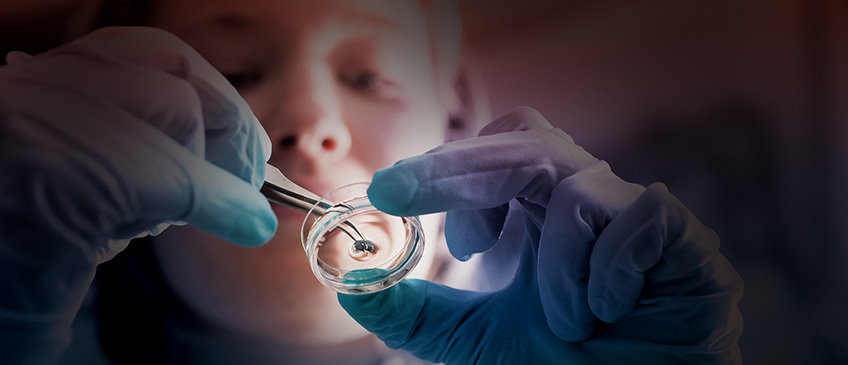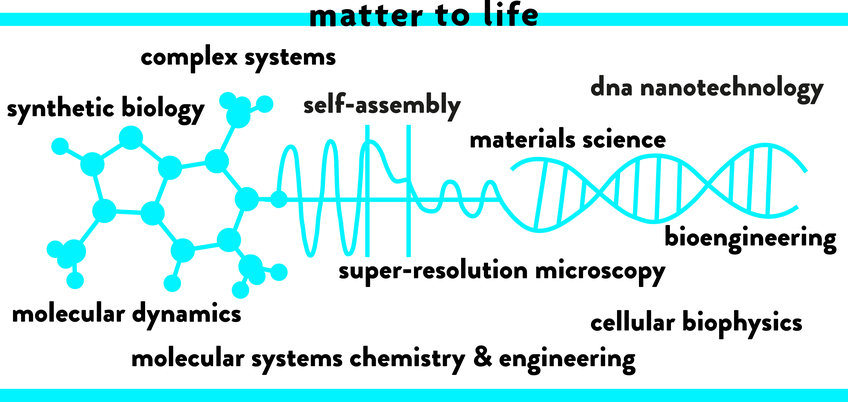Masterstudiengang Matter to Life

Matter to Life umfasst Teilbereiche wie die Bionanotechnologie und die synthetische Biologie. In der Bionanotechnologie werden bspw. synthetische Nanobausteine aus Biomaterialien genutzt, um molekulare Maschinen zu kreieren. Dies könnten eines Tages Nanomaschinen sein, die sich eigenständig bewegen, katalytische Aktivität aufweisen oder mechanische Kräfte ausüben können. Oder man stelle sich wenige Nanometer große Transportshuttles vor, die Krebszellen gezielt attackieren können. Die synthetische Biologie beschäftigt sich mit der Herausforderung biologische Systeme auf der Skala von Zellen oder Zellverbünden so zu manipulieren, dass gänzlich neue Funktionen aus ihnen hervorgehen. Bakterienstämme könnten dann mathematische Programme ausführen, wie bspw. bis zehn zu zählen. Oder sie wären eines Tages in der Lage völlig neue Rohstoffe und Medikamente herzustellen, oder Abfall zu verwerten. Ein weiteres Ziel ist es, lebensähnliche Minimalsysteme aus einzelnen Bausteinen zu kreieren. So könnten bspw. künstliche Zellen erzeugt werden, die sich selbst vervielfältigen oder sich bewegen können. Ein anderer Bereich der synthetischen Biologie , das DNA-Computing, erforscht die Programmierbarkeit von DNA mit der Vision, DNA als neues Speichermedium und programmierbares Biomaterial für die Erschaffung biologischer Rechenmaschinen zu nutzen. Ein weiteres Ziel ist es biologische Systeme quantitativ zu beschreiben und zu modellieren um zuverlässige Vorhersagen über das Verhalten biologischer Systeme treffen zu können. Aus der Modellierung lebendiger und lebensähnlicher Systeme lässt sich dann auch ein komplett neuer Zugang zu der zentralen Frage, was lebendige Systeme eigentlich ausmacht, ableiten. Auf diese Weise kann ein tiefergreifendes Verständnis biologischer Prozesse für die Grundlagenforschung ermöglicht werden.
Noch sind der Großteil der genannten Ziele Zukunftsvisionen, denn die Wissenschaft steckt hier noch in den Kinderschuhen. Doch bereits heute sind Dinge denkbar, die sich vor fünf Jahren niemand vorstellen konnte. Dies zeigt die Geschwindigkeit des jungen Feldes, in dem neue Technologien aus unterschiedlichsten wissenschaftlichen Disziplinen wie der Mathematik, Informatik, Computerwissenschaften, Physik, Maschinenbau, der Elektrotechnik, der Nanotechnologie, der Genetik, der Biochemie oder der Chemie mit der Anwendung auf Biosysteme konvergieren um völlig neue Anwendungen zu ermöglichen und die Grenzen des Möglichen immer wieder zu testen.

Der Masterstudiengang ist ein konsekutiver, viersemestriger Studiengang, der jährlich im Wintersemester begonnen werden kann. Die Zulassung zum Studiengang erfolgt über ein Eignungsverfahren.
Ziel des Studiengangs ist es, das eigenständige und kreative Denken der Studierenden zu fördern. Im Bereich Matter to Life kann dieses Wissen am besten in einem Learning-by-Doing Ansatz direkt an der Laborbank während der Bearbeitung einer wissenschaftlichen Fragestellung vermittelt werden. Der Anteil an Modulen, die praktisches Arbeiten im Labor vorsehen, umfasst deswegen mit insgesamt 78 Credits 65 Prozent der gesamten Leistungen.
Um zunächst mit dem explorativen Forschen vertraut zu werden, bringen die Studierenden in den ersten beiden Semestern 18 Credits für das praktische Modul Matter to Life: Exploratives Forschen ein. Dieses neu konzipierte Modul hat das Ziel, die Studierenden in ihrer Eigeninitiative für kreatives Herangehen an wissenschaftliche Fragestellungen zu bestärken. Es greift die zentrale Idee der bekannten und international renommierten Wettbewerbe iGEM und Biomod auf, bei denen multidisziplinäre Teams aus Universitätsstudenten in einem internationalen Wettbewerb antreten, um eigene Ideen für besonders innovative Forschungsprojekte aus den Bereichen der synthetischen Biologie (iGEM) und des Biodesigns (Biomod) vorzustellen. Im iGEM-Wettbewerb werden von den Teams neue Systeme mit austauschbaren biologischen Komponenten und molekularbiologischen Standardtechniken entwickelt, konstruiert, getestet und gemessen, die eines Tages neue Lösungen für allgegenwärtige Probleme darstellen könnten. Ziel des Biomod-Wettbewerbs ist es, Biomoleküle wie DNA, RNA und Proteine als Bausteine für die Erstellung autonomer Roboter, molekularer Computer und Prototypen für Therapien im Nanomaßstab zu verwenden. Jedes Jahr widmen insgesamt über 6000 Menschen ihren Sommer den iGEM-und Biomod-Wettbewerben und kommen dann jeweils im Herbst zusammen, um ihre Arbeit zu präsentieren und bei einem jährlichen Jamboree anzutreten.
In Anlehnung an dieses erfolgreiche Konzept sollen die studierenden im Modul Matter to Life: Exploratives Forschen in deutlich kleineren Gruppen aus drei bis vier Personen über den Zeitraum von zwei Semestern flexibel ein Forschungsproposal aus dem Bereich Matter to Life erarbeiten. Hierbei sind die Gruppen selbst an der Formulierung der eigenen Themenstellung beteiligt, die generell so gewählt ist, dass ein exploratives Vorgehen notwendig ist um sich dem Thema zu nähern. Die Themen greifen aktuelle Entwicklungen des Gebiets Matter to Life auf und formulieren innovative Ideen für neue Anwendungen. Mögliche Themenstellungen könnten bspw. wie folgt lauten:
- Design eines chemischen Reaktionsnetzwerks, das eine neue Funktion erfüllt
- Design und Anwendung einer funktionellen DNA-Nanostruktur
- Biomedizinische Anwendung künstlicher Zellen
- Nanoroboter für die chemische Synthese
Aufgabe der Gruppen ist es dann, ein schlüssiges Forschungskonzept zu erstellen und auf Basis der Ergebnisse von praktischen (Vor-)Versuchen und, falls möglich, theoretischen Modellierungen ein wissenschaftliches Proposal und eine Posterpräsentation zu erstellen, die die Plausibilität und Machbarkeit des Vorschlags darlegen. Zum Ende des zweiten Semesters präsentieren die Gruppen ihre Arbeit studiengangsintern dem Rest ihres Jahrgangs und einem Prüfungskomitee bei einer Poster- und Vortragssession.
Die Arbeit der Studierenden wird hierbei durch einen Betreuer pro Gruppe begleitet, dessen Aufgabe in erster Linie darin liegt, den kreativen out-of-the-box-Denkprozess in der Gruppe anzuregen und falls notwendig Hilfestellung bei der praktischen Einarbeitung und der Vorplanung der praktischen Arbeiten zu geben. In den Prozess der Lösungsfindung greift der Betreuer so wenig wie möglich ein, um das eigenständige Denken der Studierenden zu bestärken. Durch die Teilnahme am Modul Matter to Life: Exploratives Forschen sammeln die Studierenden praktische Laborerfahrungen, die sie erstmals mit eigenständigem Out-of-the-Box-Denken kombinieren. Die Arbeit an einem Projektproposal bringt den Studierenden Methoden für die Planung wissenschaftlicher Projekte näher und schafft erste Einblicke in das Schreiben wissenschaftlicher Anträge, was speziell in der späteren Doktorandenphase an Bedeutung gewinnen wird. Die vorgegebene Themenstellung vermittelt den Studierenden erste Erfahrungen in der kollaborativen Bearbeitung multidisziplinärer Projekte und kann neue Anstöße für eine mögliche Themenwahl im späteren kollaborativen Forschungspraktikum, der Master’s Thesis oder der Promotion geben. Die Arbeit in Gruppen stärkt zudem ab Beginn des Studiums die Vernetzung im Jahrgang und trainiert die Team- und Kommunikationsfähigkeit der Studierenden.
Parallel zu ihrer Arbeit am Modul Matter to Life: Exploratives Forschen nutzen die Studierenden die ersten beiden Semester zur Bearbeitung (überwiegend) theoretischer Module, in denen sie ihr Fachwissen erweitern und vertiefen. Mit einem Anteil von 35 Credits können die Studierenden durch die Belegung von Wahlmodulen im naturwissenschaftlichen Bereich ihre eigenen Interessen verfolgen und auf individuellen Kompetenzen aufbauen. Thematisch ist den Studierenden hier eine große Wahlfreiheit von Modulen der Fakultäten für Physik, Chemie, Medizin, Mathematik, Maschinenbau, Elektrotechnik und dem WZW eingeräumt. Dies begründet sich in dem Studiengangsziel, kreative Innovatoren mit unterschiedlichen Skill-Sets auszubilden, die im späteren Forschungswirken aus unterschiedlichen Perspektiven im Bereich Matter to Life (der synthetischen Biophysik, der synthetischen Biologie und des molekularen Bioengineerings) arbeiten. Die Wahlfreiheit ermöglicht allen Studierenden einen passenden Anschluss an die unterschiedlichen Grundausbildungen aus den Bachelorstudiengängen Physik, Chemie, Biochemie oder Bioengineering, die für den Studiengang zugelassen sind. Durch die Kombination verschiedener Wahlmodule aus den Bereichen Mathematik/Informatik/Extern, (Bio)Chemie und Physik können die Absolventen ihr Wissen in ihren individuellen Interessensgebieten vertiefen und sich zusammen mit den Erfahrungen aus den praktischen Modulen ein individuelle Fach- und Methodenkompetenz aneignen.
Die verbleibenden 7 Credits der Leistungen in den ersten beiden Semestern wenden die Studierenden auf, um sich zu Beginn ihres Masterstudiengangs im Pflichtmodul Synthetische Biologie 1 (5 CP) die Grundlagen im Engineering synthetischer biologischer Systeme und in einem Wahlmodul aus dem Bereich Ethik (2 CP) die Grundlagen ethischer Betrachtung im Kontext wissenschaftlicher Fragestellungen anzueignen, die die Studierenden gesamten Studienverlauf unter verschiedenen Perspektiven immer wieder aufgreifen und vertiefen werden.
Nach dem ersten Studienjahr haben sich die Studierenden ein individuelles Profil angeeignet und erste Ansätze für eine explorative Herangehensweise an wissenschaftliche Projekte erarbeitet. Sie sind dadurch ideal darauf vorbereitet im zweiten Studienjahr während der weitgehend eigenständigen Bearbeitung von längerfristigen angelegten wissenschaftlichen Forschungsprojekten ihr Fach-und Methodenkompetenz weiter auszubauen. Durch die Mitarbeit an aktuellen Forschungsthemen aus dem Bereich Matter to Life erhalten die Studierenden im praktischen Modul Matter to Life: Kollaboratives Forschungspraktikum und in der anschließenden Master’s Thesis direkten Einblick in den späteren Forschungsalltag. Hierbei sind eine inspirierende Forschungsumgebung in multidisziplinären Arbeitsgruppen und im Besonderen rege Diskussionen über aktuelle Forschungsprojekte, wissenschaftliche Veröffentlichungen und mögliche Lösungsansätze und Probleme im eigenen Projekt ein wesentlicher Aspekt der Ausbildung durch die praktischen Module. Die aktive Teilnahme an dieser alltäglichen Form der wissenschaftlichen Kommunikation schult nicht nur die Kommunikationsfähigkeit der Studierenden, sondern liefert zum einen wichtige Zusammenhänge für die Entwicklung neuer Lösungsansätze erfüllt zum anderen eine Vorbildfunktion für eine kreative Forschungskultur.